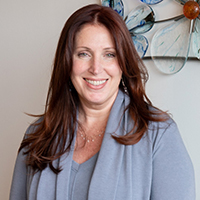Aleksandra Boskovic
Corning Incorporated, USAFor technical leadership in industrial research in optical physics and development of optical fibers, optical materials and products.

Aleksandra Boskovic, Research Director for Optics, Surfaces and Integration Technologies, Corning Incorporated, describes herself as a curious child who always wanted to know how things worked. When it came time for her to choose a career path, it was challenging to choose which field of science she wanted to pursue – she felt there were too many exciting things to follow only one. At the time, her parents encouraged her to choose a degree path that would lead directly to a job after graduation, so she decided on computer science. However, it was not a good fit for Aleksandra, so she opted for physics instead, which she felt was broad enough to allow her more career options later.
While her parents were supportive of her education, they were skeptical that a career in science was a good decision. Aleksandra shares that this was a challenge for her early on: convincing her parents that she knew what she was doing with this choice. Now, she says, “today people talk more about being a scientist…it’s more common knowledge [how to get there],” but at the time, her parents had strong reservations. She eventually gained her parents’ trust, and she now has achieved her dream.
After completing her PhD in Physics from Imperial College, UK, Aleksandra planned to go into academia. Instead, she was given an opportunity to join Corning Incorporated, an American multinational technology company that specializes in specialty glass, ceramics, and related materials. Initially, this surprised her because it was not part of her plan to work in industry. However, she adapted and joined Corning thinking it would be a great experience even if she returned to academia later. Instead, this turned out to be a defining moment for her career. She says, “I came here [to Corning], and I realized that I actually really liked the applied side of science… using it to generate something concrete.” Through this realization, she learned a valuable lesson: sometimes you have to take a chance and be flexible with your plans to find the best opportunities.
At Corning, Aleksandra is responsible for optics research as well as surfaces and thin films. She is in a leadership position and her daily work is very different from when she was a young scientist. She is responsible for setting the direction and creating a strategy for optics, surfaces and integration research that enables future advances for Corning’s businesses, as well as overseeing the projects in these areas. Aleksandra finds this strategic position fits her interests very well. Hearkening back to her broad curiosity as a child, she loves getting the opportunity to be involved in lots of different research projects rather than focusing on only one. She comments, “[As an individual scientist] there was only so much I could accomplish in a day, and it had to be focused [to progress]. Now, the breadth of technologies I get involved in is much larger…It’s very different, but very exciting.”
Aleksandra thinks that now is a fantastic time to be working in optics and photonics. While each field has a strong foundation, there are new things to discover every day. She believes there is a long road ahead for optics and photonics discoveries to continue. To get there, she advises people to “be curious.” Scientists may argue that it is a prerequisite to be curious, but Aleksandra says that, often, people limit their curiosities to their own work. It is essential to look around to adjacent fields and to think more collaboratively. She says, “the problems we are trying to tackle today are so complex that nobody can solve them on their own. You need to look at things from different angles and join forces with other areas of expertise.”
Optica has played an important part in Aleksandra’s career. Her first international conference was CLEO, and she vividly remembers the meeting’s buzz. She felt invigorated being around so many other people who were doing the same things that she was. The early networking, publishing, and presenting experiences she gained attending Optica conferences propelled her career forward. Aleksandra praises the forward-looking efforts from Optica. She says, “The society has found a way to make an impact in the field, not only from the academic side, but also for the industrial sector….it’s forward-looking, but focused on the next steps that industry needs to take.”
For Aleksandra, Optica has been a professional home and an essential factor in her success.
Photo Credit: Aleksandra Boskovic
